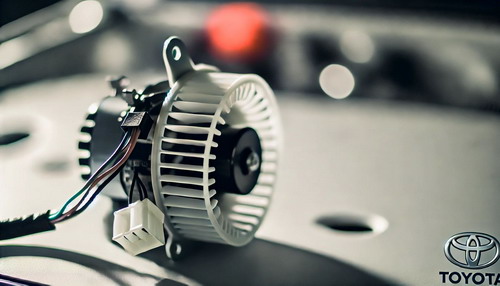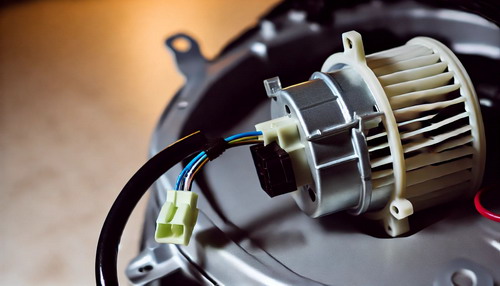HVAC blower motor problems are a common concern for Toyota Corolla owners, especially as their vehicles age. Addressing these issues early can significantly improve comfort and prevent more costly repairs down the line. Symptoms can range from inconsistent airflow to complete blower failure, requiring attention and troubleshooting.
Understanding the components of the HVAC system can help pinpoint where the issue lies. Owners may notice reduced airflow or strange noises, indicating that the blower motor may need inspection or replacement. Timely maintenance and repairs are essential to keep the Corolla’s HVAC system running efficiently.
Key Takeaways
- Blower motor issues can affect comfort and vehicle performance.
- Regular maintenance helps prevent significant HVAC problems.
- Early troubleshooting leads to effective repair solutions.
Understanding HVAC System Components
The HVAC system in a Toyota Corolla consists of crucial components that ensure proper climate control within the vehicle. Two key areas of focus are the blower motor and the control mechanisms that regulate airflow and temperature.
Blower Motor Functionality
The blower motor is essential for circulating air through the vehicle’s HVAC system. It draws air in from outside or recirculates it from within the cabin, pushing it through the vents. In a Toyota Corolla, a malfunctioning blower motor can result in inadequate airflow, leading to climate control issues.
Common symptoms of a failing blower motor include:
- No air flow: No air comes from the vents, regardless of the HVAC settings.
- Weak airflow: Air comes out but at reduced strength.
- Unusual noises: Grinding or squealing sounds may indicate a problem.
Regular inspection and timely replacement of the blower motor can help prevent these issues.
HVAC Control Mechanisms
HVAC control mechanisms in the Toyota Corolla are responsible for regulating temperature and directing airflow. The system includes switches, knobs, or buttons that the driver uses to set desired temperatures and fan speeds.
The control module interprets these settings and signals the blower motor and other components accordingly. Common problems may arise if the control module fails, leading to:
- Inconsistent temperature settings: The desired temperature may not be achieved.
- Fan speed issues: The blower motor might not respond to changes in speed settings.
Understanding these components can assist in diagnosing climate control issues and ensuring a comfortable driving experience.
Common Blower Motor Issues and Symptoms
Blower motor problems in the Toyota Corolla can manifest in various ways, leading to reduced HVAC performance. Identifying the symptoms early can prevent further issues and costly repairs.
Erratic Fan Speed
Erratic fan speed is a common symptom of blower motor issues. Drivers may notice that the fan operates inconsistently, changing speeds unexpectedly. This can occur due to a faulty blower motor resistor or a malfunctioning control module.
Potential causes include:
- Blower Motor Resistor Failure: A resistor that regulates the fan speed may wear out, causing the fan to operate at higher or lower speeds abruptly.
- Wiring Issues: Damaged or corroded wiring can lead to irregular power supply to the motor, resulting in erratic behavior.
When encountering HVAC fan speed problems, it is crucial to inspect the resistor and examine the wiring for any signs of damage.
Unusual Blower Motor Noise
Unusual noises from the blower motor can indicate underlying issues within the system. Common sounds include grinding, buzzing, or rattling. These noises often result from debris obstructing the motor or wear and tear of internal components.
Key noise indicators include:
- Grinding Sounds: This noise often indicates worn bearings or debris lodged in the blower motor.
- Buzzing: A buzzing sound may suggest electrical problems, such as a failing motor or loose connections.
Addressing these noises promptly can prevent further damage to the blower motor and improve overall HVAC functionality in the Toyota Corolla.
Electrical Aspects of Blower Motor Problems
Blower motor issues in the Toyota Corolla often stem from electrical components. Key areas of concern include fuse and relay functionality, along with the wiring and connectivity that support the blower motor’s operation.
Fuse and Relay Issues
The Toyota Corolla’s blower motor relies on specific fuses and relays to operate correctly. A blown fuse can result in a complete loss of power to the blower motor, preventing airflow from the HVAC system.
The blower motor fuse can often be found in the vehicle’s fuse box. Checking and replacing a blown fuse is a straightforward process. In addition, a faulty blower motor relay can cause similar symptoms. The relay is responsible for directing electrical power. If it fails, the motor may receive insufficient power or none at all.
Wiring and Connectivity Concerns
Wiring problems can significantly impact the blower motor’s performance in the Toyota Corolla. Frayed or damaged wires may interrupt the power supply, leading to inconsistent operation.
Connections must be secure and free of corrosion. Poor connectivity can also cause intermittent blower function. Regular inspections of the wiring harness, along with cleaning of any corroded connectors, can help maintain reliable operation. Identifying and addressing these electrical aspects can ensure the blower motor operates efficiently and effectively.
Troubleshooting the Blower Motor
Troubleshooting the blower motor in a Toyota Corolla involves several steps. Start by checking if the blower motor functions at all. If it fails to operate, it may require a replacement.
Common Steps to Diagnose Issues:
- Inspect Fuses: Check the fuse linked to the blower motor. A blown fuse will stop the motor from working.
- Test the Blower Motor Resistor: The resistor regulates the fan speed. If the motor only works on certain speeds or not at all, the resistor may be faulty.
- Listen for Noises: Unusual sounds from the blower could indicate debris in the motor or damage to the fan itself.
Basic Tools Needed:
- Multimeter
- Screwdriver set
- Flashlight
If the blower motor operates intermittently, inspecting wiring connections is essential. Corrosion or loose wires can contribute to intermittent function.
Steps to Inspect Wiring:
- Disconnect the battery to avoid electrical shock.
- Remove the blower motor from its housing.
- Check connectors for corrosion and clean if necessary.
After these checks, if the blower motor does not function, replacement may be needed. Always consult the vehicle’s manual for specific troubleshooting details related to the Corolla HVAC system.
Replacement and Repair Solutions
Addressing HVAC blower motor problems in a Toyota Corolla involves understanding both DIY and professional repair options. Each approach has its benefits and can effectively restore the vehicle’s heating and cooling functions.
DIY Blower Motor Replacement
Replacing the blower motor can be a feasible task for those with basic mechanical skills. The process typically includes the following steps:
- Gather Tools and Parts: Necessary tools often include screwdrivers, pliers, and a socket set. A new blower motor compatible with the Corolla model must be procured.
- Remove Interior Trim: Detach the dashboard or lower panel to access the blower motor. Look for screws and clips that hold it in place.
- Disconnect Wiring: Properly disconnect the electrical connector attached to the motor.
- Swap the Motor: Unscrew the old blower motor and replace it with the new unit. Ensure it fits securely and aligns with the mounting points.
- Reassemble and Test: Reattach the interior trim, reconnect the wiring, and test the blower motor for proper operation.
This approach can save on labor costs but requires caution to avoid damage to other components.
Professional HVAC Service Options
For those who prefer expert assistance, various professional services are available. A qualified technician can provide thorough diagnostics and repair.
- Comprehensive Check-Up: The service often begins with a complete inspection to identify any additional issues, such as electrical problems or duct obstructions.
- Warranty on Parts and Labor: Many professional services offer warranties, providing peace of mind regarding the durability of the repair.
- Time Efficiency: Professionals can typically complete the job faster than a DIY approach, especially if unexpected complications arise.
- Advanced Tools: Technicians have access to specialized equipment that can help pinpoint issues that may not be evident during a DIY inspection.
Opting for professional service can ensure that the Corolla’s HVAC system operates efficiently and reliably.
Maintenance to Prevent HVAC Blower Issues
Regular maintenance is crucial for preventing HVAC blower motor problems in a Toyota Corolla. It can prolong the life of the blower motor and ensure optimal performance.
Tips for Maintenance
- Filter Replacement: Change the cabin air filter every 15,000 to 30,000 miles. A clogged filter restricts airflow, causing strain on the blower motor.
- Check Wiring: Inspect wiring connections for wear or damage. Loose or corroded connections can lead to electrical issues with the blower motor.
- Listen for Noises: Pay attention to unusual noises while the blower is in operation. This can indicate debris or mechanical issues.
- Clean Vents: Ensure air intake vents are clean and free from debris. Blocked vents limit airflow and can impact performance.
- Use the System Regularly: Regularly use the HVAC system, especially the blower motor, to keep it functioning properly. This prevents parts from seizing up.
Monitoring Performance
- Watch for Decreased Airflow: If airflow diminishes suddenly, it may signal a problem.
- Temperature Changes: Notice if the temperature fluctuates unexpectedly. This could indicate issues with the HVAC system.
Routine inspections and attention to detail can minimize potential HVAC blower issues in the Toyota Corolla. It is essential to stay proactive to avoid costly repairs.
Optimizing HVAC Performance
To ensure optimal HVAC performance in a Toyota Corolla, regular maintenance is essential. Monitoring the functionality of the blower motor can help identify potential issues before they escalate.
Common Causes of Poor Performance:
- Clogged air filters can restrict airflow.
- Damaged blower motors may result in inadequate air circulation.
- Electrical issues can prevent the HVAC fan from functioning properly.
Maintenance Tips:
- Inspect Filters Regularly: Replace or clean the cabin air filter every 15,000 to 20,000 miles.
- Check Blower Motor Functionality: Listen for unusual noises indicating a failing motor.
- Examine Electrical Connections: Ensure all wiring is secure and free from corrosion.
If experiencing Toyota Corolla HVAC fan not blowing, troubleshooting can pinpoint the root cause. Checking fuses and relays may resolve the issue quickly.
When to Seek Professional Help:
- Persistent blower motor problems that do not respond to basic fixes.
- Unusual odors or sounds from the HVAC system.
By adhering to these practices, individuals can enhance the HVAC system’s performance, ensuring comfort and efficiency during drives.
FAQs: Toyota Corolla HVAC Blower Motor Problems
Q1: What are common HVAC issues in a Toyota Corolla?
Common HVAC issues in a Toyota Corolla include the blower motor not working, strange noises from the blower motor, problems with fan speed, and issues with the HVAC blower motor resistor or relay.
Q2: Why is my Toyota Corolla’s blower motor not working?
The blower motor might not work due to a blown fuse, a faulty blower motor, issues with the blower motor resistor or relay, or wiring problems.
Q3: How do I replace the HVAC blower motor in my Toyota Corolla?
To replace the HVAC blower motor, locate the motor under the dashboard, disconnect the electrical connector, and remove the screws or bolts holding it in place. Refer to the vehicle’s manual or consult a professional mechanic for detailed instructions.
Q4: What causes noise from the blower motor in a Toyota Corolla?
Noises from the blower motor can be caused by debris in the blower motor fan, a worn-out motor, or a failing bearing. Regular maintenance can help prevent these issues.
Q5: How can I troubleshoot my Toyota Corolla’s HVAC blower motor?
Start by checking the fuse for the blower motor. If the fuse is intact, inspect the blower motor resistor and relay. If these components are functional, the issue might be with the blower motor itself or the wiring.
Q6: Why is my Toyota Corolla’s HVAC fan speed inconsistent?
Inconsistent fan speed is often caused by a failing blower motor resistor, which controls the fan speed. Replacing the resistor usually resolves the issue.
Q7: What should I do if my Toyota Corolla’s HVAC blower motor fuse is blown?
If the blower motor fuse is blown, replace it with a fuse of the same rating. If the new fuse blows again, there may be a deeper electrical issue that needs professional attention.
Q8: How do I fix wiring problems with my Toyota Corolla’s HVAC blower motor?
Fixing wiring problems involves inspecting the wiring for damage, such as fraying or corrosion, and repairing or replacing damaged wiring. If you’re not experienced with automotive electrical systems, seek assistance from a professional mechanic.
Q9: What are the signs of a failing blower motor relay in a Toyota Corolla?
Signs of a failing blower motor relay include the blower motor not turning on, intermittent operation, or the fan only working at certain speeds. Replacing the relay usually resolves these issues.
Q10: Why is my Toyota Corolla’s HVAC blower motor not blowing air?
If the blower motor is not blowing air, it could be due to a faulty motor, a bad resistor, or an issue with the relay. Checking these components and replacing any that are faulty can resolve the problem.
Q11: What should I do if my Toyota Corolla’s HVAC blower motor has wiring problems?
Inspect the wiring for any visible damage such as fraying or corrosion, and repair or replace any damaged wiring. If you’re not experienced with automotive electrical systems, it’s best to seek assistance from a professional mechanic.
Q12: How do I know if my Toyota Corolla’s HVAC blower motor resistor is bad?
A bad blower motor resistor may cause the fan to work only at certain speeds or not at all. Replacing the resistor can usually fix this issue.
Q13: What causes HVAC fan speed problems in a Toyota Corolla?
Fan speed problems are often caused by a failing blower motor resistor. Replacing the resistor typically resolves the issue.
Q14: How can I identify a blown HVAC blower motor fuse in my Toyota Corolla?
Check the fuse box for the blower motor fuse. If the fuse is blown, replace it with one of the same rating. If the new fuse blows again, there may be a deeper electrical issue.
Q15: What steps should I take if my Toyota Corolla’s HVAC blower motor is not blowing air?
Check the fuse, blower motor, resistor, and relay for any faults. Replace any components that are found to be faulty to restore proper operation.

When he’s not working his magic under the hood, Ethan Wilson is usually sharing his love for Toyota cars through his writing. Ethan’s got a special talent for breaking down complex car topics into easy-to-understand articles, making him a go-to source for Toyota enthusiasts everywhere.





